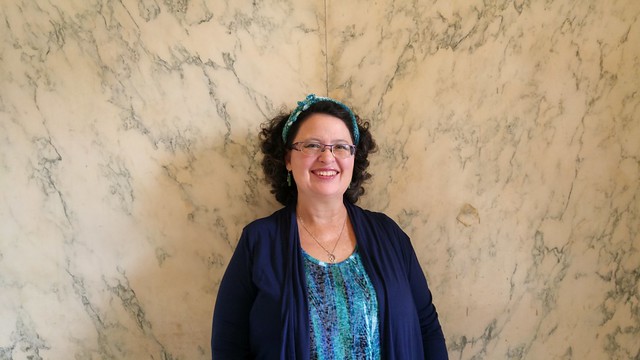
September is Ovarian Cancer Awareness Month. Deirdre Holder, FSA regulatory review director, was diagnosed two years ago at stage 3a and is now a survivor in remission. Here, she shares her story.
Tell us about your work at the USDA.
I am a 27-year career employee with the USDA, working at three agencies at headquarters. I’ve spent years working through a variety of USDA regulations – writing them, analyzing policy to determine the best way to change them and to implement new regulations, reviewing and revising them, but most importantly making them understandable. U.S. farmers and ranchers should not have to hire a lawyer to understand USDA regulations. I started with the scientific writing for APHIS regulations, then moved on to the economic and fairness regulations for the Packers and Stockyards Program. I also worked on grain standards regulations for the grain side of the Grain Inspection Packers and Stockyards Service. For the past 11 years, I’ve been helping the Farm Service Agency implement the farm safety net programs from Farm Bills and other legislation.
How did you learn you had cancer?
Getting a cancer diagnosis was completely unexpected – my diagnosis story is in large part a story of good health insurance, thanks to my job here at USDA, and in being my own advocate about my health and what I was experiencing.
Symptoms and getting a diagnosis are different for everyone. I had pain in my lower abdomen, and I was able to get a same day appointment. When the doctor didn’t see signs of an infection, he listened to me and suggested a CT scan, which might show signs of infection that other tests did not. That day, I got the scan, and the next day, the results showed an indeterminate 17-centimeter mass in my right ovary. The next step was an appointment with an OB-GYN, a surgeon, and surgery – all in one and a half weeks. Two weeks after surgery, the pathology showed ovarian cancer stage 3a (out of 4). Then chemotherapy – six rounds, three weeks apart. I was astounded to hear my medical oncologist say “curative intent” about my planned treatment, when I asked about my prognosis and the statistics. I am the first person in my family to survive cancer.
If you were in USDA headquarters from October 2016 – May 2017, you may remember seeing me … I knit and wore fun hats – many that looked like hair.
What should people know about ovarian cancer?
There are approximately 30 different types of ovarian cancer – with no obvious symptoms. While there is no early detection test, awareness of symptoms can help the doctor consider options. Some women experience symptoms such as bloating or pelvic pain that are nonspecific and easy to dismiss or misdiagnose. For example, I would eat and be full after a few bites, but I never considered it a symptom of anything. Women should know that an annual pap smear does not test for ovarian cancer; it tests for cervical cancer. Approximately eighty percent of cases are diagnosed at late stages, as mine was, decreasing survival. It’s important to get to the right OB-GYN who listens. There are reliable sources for more detailed information, such as the National Institute of Health’s National Cancer Institute.
You know your body best. If something is different, if you are experiencing symptoms that are not normal for you for two weeks, go to the doctor, don’t play Dr. Google. Be clear, direct, and complete when talking to your doctor about your symptoms – even if they seem unrelated or easily explained. They paint the whole picture and may have meaning beyond how they appear to you.
What’s your advice for workplace colleagues?
Treatment may slow a person down and cause more days out of the office, but they are the same person with the same interests. Some people are open to talking about it – however, some people are not. Work can be a place to go that is away from treatment, away from being a patient. Work can be a place to be yourself and do work that makes a difference.
Many people don’t know what to say – so they say nothing or avoid the person. What’s better is to talk to the person like you always have, or be honest and say, “I don’t know what to say.” If you want to help, offer specific help. Think about what you can do, what would be meaningful to them, and offer that. Sometimes it’s enough to call, text, or e-mail while they are away from the office. Another thing to remember is that we have access to helpful resources – as a coworker or supervisor, you can reach out to EAP as a source to help you, too.
Anything else you’d like to add?
I had an excellent medical team & terrific support from my husband – I also had my USDA family. I felt the support from my FSA coworkers, those I work closely with in other USDA agencies and offices, and other friends in the building. People were rooting for me and sharing their stories. As an extrovert, it was good for my energy to be able to come into work whenever I was physically able. Physically, it was good to get some exercise just walking these long hallways.
I knew I needed support – I got teal ovarian cancer “curative intent” bracelets and shared them. Seeing coworkers wear them lifted me up.
The positivity of feeling like I could still make a difference through my work and to be able to focus on something other than cancer, chemo, and side effects was very encouraging. I was so grateful to my USDA colleagues. Their support helped me in my healing journey.


